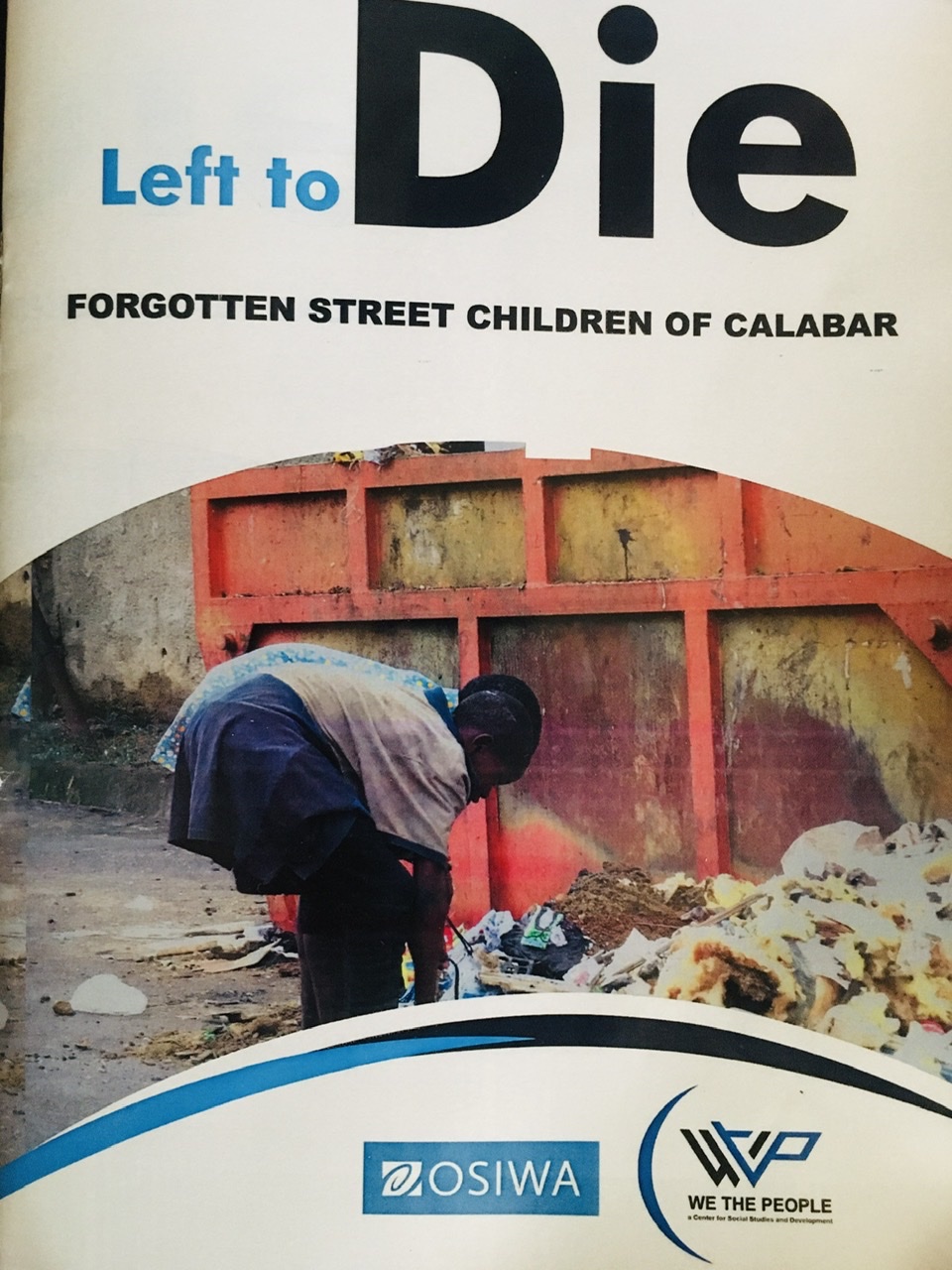By Jonathan Ugbal
The attitude of the citizenry towards the street children phenomenon has been identified as the bane of their existence, a situation which has also led to increased crime rates said Ken Henshaw, Executive Director in Calabar on Tuesday while presenting a report on street children researched by We The People, a non governmental organization.
The report is titled: “Left To Die, The Forgotten Street Children Of Calabar.”
According to Ken, both government, pressure groups and the public no longer “feel” the pains street children undergo and the attendant challenges bedeviling the society due to their existence.
“Our society has developed an immunity towards feeling it. We see it but don’t feel it anymore,” said Ken who said their findings showed that the failure of the Cross River state government to implement the Child Rights law was largely to blame for the phenomenon.
“The major reason this phenomenon of street children has continued is because the state government has failed to implement the Cross River state child law and the lethargic attitude of the institutions charged with the responsibility of taking care of them,” he said.
The report shows that there is an increasing number of street children in Calabar with the government’s punitive approach not solving the core problems of which child abuse, witch branding, failure of child care institutions and bad parenting were identified as the primary causes. These force the kids to escape from home and in order to fend for themselves, have most times, resorted to crime.
“The victims, sometimes children less than 10 years old are blamed for the abuses they suffer and the fact that their society has failed to protect them. They are regarded as vermin, parasites and pollutants of social good that need to be eliminated, not helped or supported. Exposed in this manner, they have become victims of criminals who specialize in converting them to a life of violence and crime.
“Unfortunately, the responses of the government has mostly been punitive, the key one being the formation of ‘Operation Skolombo’. These approaches do not take into consideration the deeper and more far reaching issues including how the kids got on the street in the first place, and what needs to be done to reverse the trend,” he said.
Three measures which include the establishment of frameworks to fully implement the Child Rights law; establishment of rehabilitation centers which will provide counseling services, drug recovery and rehabilitation services as well as deliberate political will to take punitive actions against religious bodies and traditional institutions that promote the labeling and stigmatization of children were recommended in the report.
Panelists at the event also decried the poor attention paid to the street children by the Governor Ben Ayade’s administration and sought for deeper collaboration and increased government efforts to solve the challenge.
“One of the major driver is the attitude of the people. People find a way to blame the children for being in the street. There must be repercussions for throwing your children in the street. If you go to church and you shout and your child is the witch that beats you, then, dump that religion and go practice another one,” said Pamela Braide, a development expert.
For Williams Arikpo, who served as program manager for the Destiny Child Center, a rehabilitation project operated by Mrs. Obioma Imoke, wife of former Governor Liyel Imoke, the street children issue is decades old and not a new phenomenon.
“As at the time I began working on this issue in 2003, I met kids who had spent five, seven or more years in the street,” Arikpo said and blamed the current administration for the discontinuation of the Destiny Child Center.
“I will describe the DCC as a success while I was there but of course sustainability has been a challenge. The handing over process was done but there was no sustainability. There was pressure that the DCC was a bid to steal Government property and some things were bought on credit to feed the children of which we have not been able to pay till date,” he said.
Furthermore, he disclosed that the Mr. Ayade’s administration decided to “repatriate” inmates of the DCC in June 2015 which they kicked against but could not stop the state from doing so.
The DCC had rehabilitated 253 inmates, but is currently illegally “occupied by families” who lost their homes, the report said.
Several street kids who have been rehabilitated shared their stories with attendees with stakeholders calling for increased pressure from civil society organizations on the government to implement the Child Rights law.
Since You Are Here, Support Good JournalismCrossRiverWatch was founded on the ideals of deploying tech tools to report in an ethical manner, news, views and analysis with a narrative that ensures transparency in governance, a good society and an accountable democracy. Everyone appreciates good journalism but it costs a lot of money. Nonetheless, it cannot be sacrificed on the altar of news commercialization. Consider making a modest contribution to support CrossRiverWatch's journalism of credibility and integrity in order to ensure that all have continuous free access to our noble endeavor. CLICK HERE |
New Feature: Don't miss any of our news again.Get all our articles in your facebook chat box.Click the Facebook Messenger Icon below to subscribe now
Text Advert by CRWatch :Place Yours

Will You To Learn How To Make Millions Of Naira Making Special Creams From Your Kitchen?.Click Here
Expose Your Business And Make More Sales. Advertise On CrossRiverWatch.com Today



Leave feedback about this